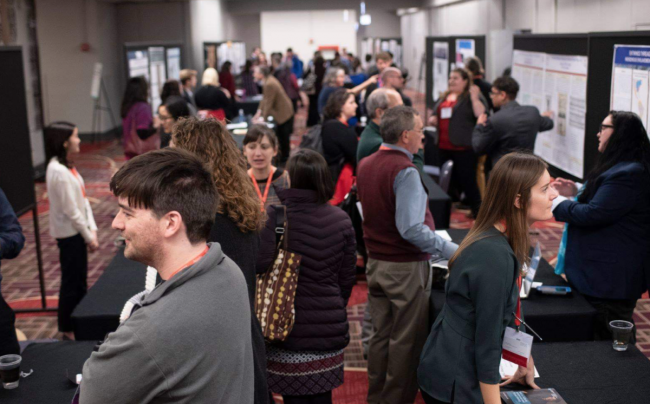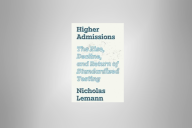You have /5 articles left.
Sign up for a free account or log in.

An exhibit hall at the American Historical Association's 2019 meeting in Chicago.
American Historical Association/Marc Monaghan
Like colleges and universities, scholarly associations had been looking forward to something resembling a normal academic year. That meant scheduling in-person annual conferences again, after more than year of virtual programs.
The Delta variant has of course frustrated those plans and led some organizations to transition to virtual meetings once more.
The American Sociological Association, for instance, called off its Chicago conference, planned for last month, after "it became clear that the global health crisis would not be resolved by our meeting dates and a large gathering of people from around the world would present an untenable health risk," said Nancy Kidd, the group's executive director.
Instead of meeting in person, the ASA welcomed sociologists to an online meeting that included hundreds of sessions, plus virtual social events, games and exhibits. Kidd said the event was successful, in terms of attendance and engagement. The group's 2022 meeting is still scheduled for Los Angeles.
The Association of Public and Land-Grant Universities last week pulled the plug on its annual meeting, set for Philadelphia in November. The group will now convene its meeting online.
Jeff Lieberson, APLU's spokesperson, said, "We wanted to have an in-person meeting and that was the plan." But after having conversations with members across the country and examining the state of the pandemic, including the spread of the Delta variant, he said, the group determined it wasn't "practical to have an in-person annual meeting. The health and safety of APLU staff and members has been and always will be a top priority."
Other associations are moving ahead with in-person conferences this year, citing members' desire for this kind of experience. Aware of the health risks, organizations say they're taking their health and safety cues from federal and local officials. This generally means setting expectations or requiring that attendees be vaccinated and wear masks.
These associations are also offering select virtual options for colleagues who opt to stay home.
'They Miss the In-Person Experience'
The American Political Science Association meeting starts Sept. 30 in Seattle. Some 2,500 scholars are expected to show up. Another 2,500 are expected to register virtually. In-person attendees must show proof of full vaccination, wear masks and be mindful of social distancing.
Pre-pandemic, APSA could expect 6,000 to 7,000 political scientists to attend its annual meeting. APSA's first and likely only fully virtual conference, held last year, saw some 6,000 attendees. The organization was pleased with that turnout. But it decided on a face-to-face format this year, due in part to member feedback.
"We certainly have heard from our members that they miss the in-person experience. There's no question," said Steven Rathgeb Smith, APSA's executive director. "And I think it's particularly true for graduate students and younger scholars who are in the early stages of their careers, as the kinds of contacts you make at an in-person meeting and the chance to showcase your work are all invaluable."
The American Studies Association is holding its annual meeting early next month in San Juan, Puerto Rico. The four-day, in-person conference will be followed immediately by a virtual conference. John Stephens, executive director of the association, said that 60 percent of members said they wanted to meet in person when they were surveyed about their preferences in May.
Paula Krebs, executive director of the Modern Language Association, said that 52 percent of members who submitted sessions for the upcoming January convention -- still planned for Washington -- said they preferred to present in person.
"We were a little surprised by that because this was the height of the pandemic -- our deadline was April 1," Krebs said. "But at that point, people were really looking ahead and knew they wanted to be in person. And so we were happy to accommodate them and make it so that they could present in person."
The MLA pivoted to a virtual annual meeting in 2021, with some 5,054 members attending 766 sessions. The event was successful by any measure, attracting even more attendees than the group's last in-person meeting, in Seattle in early 2020. But Krebs said that many members have since commented about the 2021 virtual meeting, "'I really got a lot out of this, I've got no complaints, it went well for me, but, God I miss seeing people and meeting people accidentally in, say, the exhibit hall.'"
"People are really, really craving that in-person experience," Krebs said.
As of now, the American Historical Association plans on meeting in person in January in New Orleans, for similar reasons. Jim Grossman, executive director, said he and colleagues are planning to continue aspects of the yearlong Virtual AHA program they organized in 2021 due to the pandemic. Yet future remote opportunities "don't necessarily have to be tied with the meeting," Grossman said. "The meeting will remain in-person centered, as of right now."
The upcoming APSA conference will have a major virtual component. But Smith said, "I think we're all hoping that we'll be able to get back to an event space where we just have people come and it's a quote-unquote, normal meeting."
A(Not Fully) Hybrid Model Emerges
Similar to other groups' plans, in-person attendees at this year's APSA may attend any virtual panel, but virtual attendees will not have access to all in-person panels.
A significant portion of American studies scholars did say they wanted to meet virtually, when surveyed. But their association found that streaming panels live from the conference site for a partial audience at home would be cost-prohibitive, hence the back-to-back model.
Many other organizations say the technology costs associated with streaming hundreds of panels from a conference site to a partial virtual audience is the biggest practical barrier to running a fully hybrid conference, now or in the future. Whereas online-only conferences may involve a single platform or service, such the Conference Exchange, or Confex, arranging on-the-ground streaming is more complicated -- and expensive.
Twelve percent of panels at the January MLA convention are scheduled to be virtual, based on presenters' preferences. Remote attendees will be able to tune into virtual sessions, other options designed for them, and some keynotes or addresses. In terms of in-person events, though, streaming options will be limited.
Krebs, of the MLA said, "We certainly know how to run an in-person convention. We have been doing that for a long long time and we do that really well. Where you get into trouble is trying to mix the two, and part of that is the cost. If you're going to have internet access and streaming in an in-person session, then you're working with hotel AV costs that make the convention absolutely unaffordable."
Logistics are another concern, especially as most scholarly associations have small staffs.
Grossman, of the AHA, equated running a truly hybrid conference to running two meetings, one face-to-face and one remote, at the same time.
"We don't have the staffing to do both at once," he said.
While fully hybrid conferences aren't the way of the future, most groups are committed to offering virtual conference elements beyond this year. Some academics have called for this for a long time, and online conferences have proven to be more accessible -- in terms of disability, affordability and time -- for many scholars since March 2020.
What Is a Conference For?
Krebs, of the MLA, said that her organization will offer "robust" programs and social opportunities for virtual attendees, including international scholars, going forward. In terms of accessibility, the MLA consistently works with disabled scholars to accommodate them during meetings, she said. But three groups that often lack travel budgets and therefore stand to benefit financially from continued remote options are graduate students, community college professors and contingent faculty members.
Smith noted that some scholars also question the value -- and the carbon footprint -- of in-person meetings from a climate science perspective. So for that and other reasons, he said that APSA is committed to its new, "mixed" format, his own desire for "normal," post-pandemic meetings notwithstanding.
Thinking through how to proceed with annual conferences during and after the pandemic means thinking about why people want to attend them in the first place. Annual disciplinary meetings used to be a locus for faculty job interviews in many fields. But scholarly associations have moved away from this tradition in recent years, with organizers citing concerns about young scholars paying their way to the conference to be interviewed for increasingly scarce jobs, one after the next, in hotel suites.
In this sense and others, annual conferences were changing even before COVID-19.
Grossman said that historians attend the AHA annual meeting to present their work, to discuss their research with scholars in and out of their specialty and to learn what's happening in other fields. They "cruise" the exhibition hall for resources and they seek professional development and collaboration on assignment design and curriculum initiatives, he continued. And, perhaps especially, scholars want to "maintain in-person relationships with friends and colleagues from different stages of one's career."
Sometimes that comes down to bumping into "Twitter friends" in the elevator, Grossman added.
Similarly, Smith, of APSA, said of in-person meetings, "You just can't duplicate that kind of experience in a virtual space, even if you have gotten accustomed to Zoom and giving Zoom presentations and having Zoom roundtables."
Holding an in-person conference with virtual elements isn't just for the humanities and social sciences. The American Physical Society, for instance, is planning on this format for its upcoming March meeting in Chicago. It expects 12,000 physicists to attend.
Beyond the Pandemic
A recent survey of 172 research university professors in the sciences, technology engineering and math from the U.S., Canada and elsewhere, found that respondents had attended between three and four conferences since March 2020. Nearly all of them were online. About half of all respondents said they felt safe about attending scientific conferences in person, with just 23 percent of scholars in the U.S. saying they felt unsafe. Older respondents were more likely to say they felt unsafe. The survey organization Primary Research Group fielded questions between mid-June and mid-July, after the emergence of the Delta variant but before it became so dominant in the U.S.
Asked how scientific and other professional conferences will change, or not, post-pandemic, respondents generally expressed enthusiasm for online conferences and expected hybrid conferences to become the norm. Scholars positively associated time-saving, lower costs and convenience with online meetings. Nevertheless, few respondents wanted online conferences to completely or even largely displace in-person events. Asked which aspects of online conferences should be maintained post-pandemic, scholars cited benefits such as being able to reference recorded sessions and even pre-record sessions.
In response to a slightly different question about technology, many scholars said they welcomed the flexibility and lower cost of attendance of the online experience, but said they lost some sense the personal experience.
"The pervasive and likely continuation of online access to conferences may significantly alter the economics of conference staging," wrote the survey report's authors, "leading to a broader base of participants, participating at different tiers and price levels, and perhaps making more and better conferences possible through superior financial support enabled by this more inclusive model."
Over the next year, 45 percent of respondents expected to attend "about the same" number of conferences as they had prior to the pandemic. Some 28 percent expect to attend fewer conferences in person in the year ahead and 22 percent expect to attend more.
Safety and Other Concerns
While cautiously optimistic, scholarly associations with upcoming in-person meetings are concerned about what the near-term future holds, and not just in terms of program offerings and safety. Finances are on the line, too.
With exceptions, annual conferences aren't big money-makers for professional organizations. Some groups say they break even in typical years. But a critical mass of attendees is needed to make that happen, and some hotels discount conference hall space based on members booking a certain number of rooms on-site. In any case, no organization can afford to consistently lose money on conferences -- especially by breaking contracts with conference hotels and centers that were inked years before COVID-19.
"Of course we're worried," said Grossman, of the AHA. "Everyone with upcoming conferences is worried for all sorts of reasons. We are developing as many contingency plans as we can for various possibilities."
Yet as the last 18 months have made clear, he said, "predictability is not something one should depend on. And we are watching what happens with fall conferences so we can learn from our colleagues in other scholarly associations."
Planning in-person events right now is not uncontroversial. Some scholars say they can't support meetings that seem to be encouraging in-person over virtual participation, especially in areas that have been hit hard by the Delta variant.
Rae Walker, associate professor of nursing at the University of Massachusetts at Amherst, said they recently declined an invitation to present at a Dallas-based conference, as the sponsor organization's policies surrounding virtual participation were unclear.
"Last year countless professional organizations professed their commitments to social justice, anti-racism and combatting COVID-19," Walker said. "Hundreds abruptly moved their conferences from in-person to remote. But now that we're more than a year-and-a-half into this pandemic, many academic conferences have moved back to in-person, even though COVID-19 is airborne, the Delta variant can be transmitted among fully-vaccinated persons, and some members of the public such as folks who are immunocompromised and children under 12 remain ineligible for the vaccine."
Even where remote participation is possible, "this seems to be a lower-tier option," Walker said. Nursing and other health organizations hosting "large in-person conferences in cities like Dallas with high levels of COVID-19 transmission, where ICUs are already at or near capacity and our colleagues are literally begging for support, is incompatible with our social contract as health professionals."
Walker, who is trans and nonbinary, cited additional concerns about recent anti-trans legislation in Texas. The state also faces the prospect of meeting boycotts in the wake of its recent, effective ban on abortion.
The International Congress on Medieval Studies, hosted at Western Michigan University in Kalamazoo, doesn't happen until May. But organizers have already decided to go online in 2022, citing the ongoing pandemic.
"It takes 15 months to prepare for each conference," said Jana K. Schulman, professor of English and director of the Medieval Institute at Western Michigan. "The planning process includes contracts with various on- and off-campus entities that must be made more than a year in advance. They rely on us and breaking those contracts would be expensive for the Institute and our local partners."
Beyond that, Schulman said, COVID-19 cases are "surging once again in September 2021, international travel remains restricted and global inequities in vaccine distribution are rampant." So rather than host a "smaller, less accessible Congress in 2022, we decided that it was important to remain true to our name," an international congress.
When the group meets again in person, in 2023, "we want all who wish to come to be able to do so."
Regional associations have had to make similar decisions. The Southwestern Philosophical Society had been planning to meet in person in Nashville in October. It's meeting online instead, as of two weeks ago.
Paul Carron, associate professor of philosophy at Baylor University and the society's 2021 program chair, said, "We had a good bit of interest and enthusiasm about the conference," including about it being held in Nashville. Yet from the outset, Carron said, some graduate students and professors reported that their travel budgets had been frozen due to COVID-19. This threatened excluding many of the younger scholars to the association, which is particularly dedicated to mentoring. On the flip side, Carron said, some participants withdrew their papers when the conference moved online.
Finances didn't factor into the group's decision. Registration fees pay for the conference. All sessions were to be held at Vanderbilt University, at no cost, and the local hotel did not require any minimum room block.
Carron imagined that a hybrid conference would have attracted just 15 to 20 attendees, compared to the usual 50 to 60.
Bigger conferences have more room to experiment with hybrid options.
New Opportunities for Access
Schulman, of Western Michigan, said the congress wants to "remain at the forefront in terms of both inclusivity and appeal," and preparing for the 2021 online event "taught us much about increasing diversity, accessibility and inclusion in a virtual environment." Those lessons will be applied both to the virtual format in 2022, she said, and to "in-person 2023 congress that combines the camaraderie of past decades with a commitment to expanded global accessibility and reduced environmental impact."
Matt Dowell, an assistant professor of English at Towson University who is chronically ill, said that for professional organizations, "speaking broadly, accessibility has been implemented as retrofits to the traditional in-person conference." The pandemic, meanwhile, has "forced massive delivery changes to be made, so returning to in-person conferences due to habit and preference would be a missed opportunity to reimagine how academic conferences function as sites for fuller membership and participation."
Dowell said he'd like to see associations have "conversations focused on what participation in professional organizations looks like for people other than those who they've always been imagined for," meaning "securely employed, able-bodied professors with adequate funding and the life situation to be able to travel safely to another city for a stretch of time." That might require expanding executive boards to make them more representative of the full "expanse" of the organization, he added.
Cost, including how an organization spends its money, and on what, is another essential conversation, Dowell said. "Cost is certainly a big hurdle, both because it is a real challenge and because it's the go-to excuse for explaining away inaccessibility."
Amir Haji-Akbari, an assistant professor of chemical and environmental engineering at Yale University, who is currently organizing a year-round virtual series on statistical thermodynamics and molecular simulations, said there "is an inherent advantage in having all interested parties at the same location physically. Otherwise, my experience tells me that people generally get disengaged and distracted fairly easily."
Yet Haji-Akbari, who has a visual disability, said he's benefited from virtual meetings over the last 18 months, specifically the opportunity to watch lectures and talks on his own screen.
"I hope that scientific and professional societies keep this streaming service available for people like me," if not online then on-site, via tablets that share a screen with a projector, he said.









